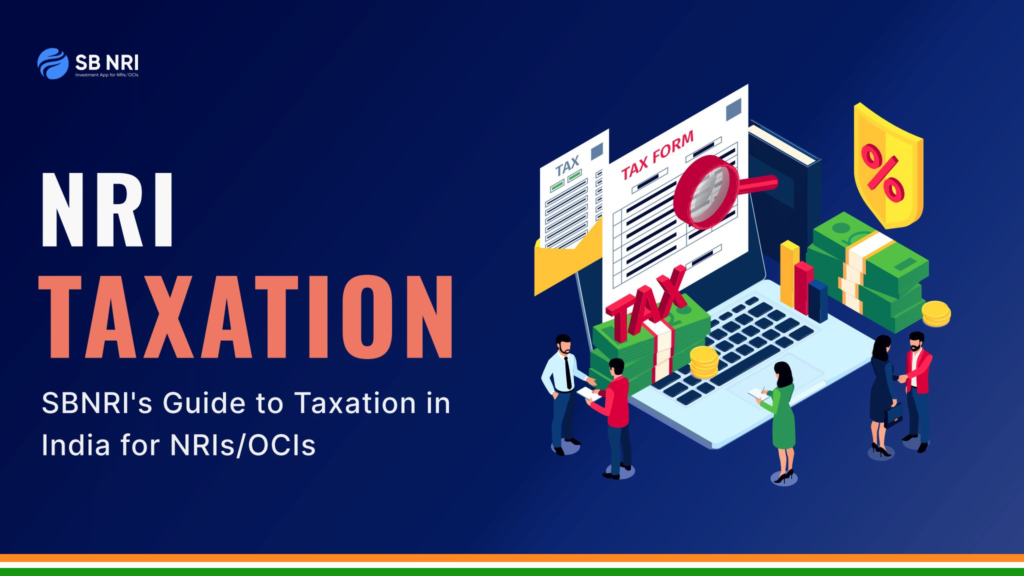
Income Tax Returns (ITR) are a crucial aspect of the Indian tax system, allowing individuals, both residents, Non-Resident Indians(NRIs), Overseas Citizens of India (OCIs), and entities to report their income, calculate their tax liability, and pay any taxes due. For NRIs/OCIs, the process can seem complex due to their unique status and the need to follow both Indian and foreign tax regulations. One common question is whether NRIs or OCIs can file ITR 1, also known as Sahaj, which is the simplest of the ITR forms. We’ll answer it and explain the different types of ITR forms for NRIs/OCIs in India to file their taxes.
Types of ITR Forms in India
The Indian Income Tax Department provides various forms for filing tax returns, each uniquely designed for different types of taxpayers and their specific sources of income. Here’s a brief overview of the main forms:
- ITR 1 (Sahaj): For individuals who are residents and have income up to ₹50 lakh from salary, one house property, and other sources (excluding lottery winnings and income from racehorses).
- ITR 2: For individuals and HUFs not having income from business or profession.
- ITR 3: For individuals and HUFs having income from a proprietary business or profession.
- ITR 4 (Sugam): For individuals, HUFs, and firms (other than LLP) who are residents and have a total income of up to ₹50 lakh and income from business and profession computed under Sections 44AD, 44ADA, or 44AE.
- ITR 5: For persons other than individuals, HUFs, companies, and persons filing Form ITR-7.
- ITR 6: For companies other than those claiming exemption under Section 11.
- ITR 7: For persons including companies required to furnish return under Sections 139(4A), 139(4B), 139(4C), or 139(4D).
Also read: ITR Filing for NRIs AY 2024-25: Step-by-Step ITR Filing Process

Can NRIs use ITR 1 to file returns?
NRIs cannot use ITR 1. This form is exclusively for resident individuals with income from salary, one house property, and other sources, and total income should not exceed ₹50 lakh. Since they do not qualify as residents, they need to opt for other ITR forms for NRIs.
Also Read: Income Tax e-filing: Top 10 NRI Income Tax Filing Benefits
Types of ITR forms for NRIs for filing returns
NRIs have specific guidelines to follow when filing their income tax returns in India. There are two options as ITR forms for NRIs when filing returns. The choice of the ITR form depends on the sources and amount of their income. Here’s a detailed look at the appropriate forms for NRIs:
- ITR 2: This form is suitable for NRIs who do not have income from a business or profession in India. It covers income from salary, house property, capital gains, and other sources, making it the appropriate choice for most NRIs.
- ITR 3: NRIs having income from a business or profession in India should use this form. It accommodates a broader range of income sources, including business and professional earnings.
Also read: 5 Tips for NRIs Filing Income Tax Returns in India
Calculate your TDS Refund with SBNRI’s TDS Refund Calculator
A TDS refund is the process of reclaiming the excess tax deducted at source by the payer if the actual tax liability of the taxpayer is lower than the TDS deducted. This situation typically arises when the income tax calculated on the total income is less than the TDS already deducted. To claim a TDS refund, taxpayers need to file an income tax return (ITR). The Income Tax Department processes the ITR and verifies the details. If the tax department finds that the TDS paid is more than the actual tax liability, the excess amount is refunded to the taxpayer.
You can easily find out how much tax refund you can get by calculating your TDS Refund from this TDS Refund Calculator.
Access SBNRI’s Exclusive NRI Taxation Guide

NRIs and OCIs can now access SBNRI’s exclusive NRI Taxation Guide covering in-depth information about DTAA, Gift Tax, Rental Income Tax, ITR Filing, Types of ITR Forms for NRIs, Capital Gain Tax, Income Tax, and more. The report will help you understand India taxation on mutual funds, other asset classes and how you can comply with the regulations.
Access NRI Taxation report here
Wrapping Up
For NRIs, understanding the correct ITR form to use is essential for compliance with Indian tax laws. While ITR 1 (Sahaj) is not an option for NRIs due to its restriction to resident individuals, NRIs can use ITR 2 or ITR 3 based on their specific income sources. ITR 2 is generally suitable for those with income from salaries, house properties, and investments, while ITR 3 is the right choice for those earning from business or professional activities. Ensuring the correct form is used will help NRIs accurately report their income, meet their tax obligations in India, and avoid penalties or Income tax notices.
Looking for NRI ITR Filing? Connect with SBNRI NRI Tax Expert CA Today!

At SBNRI, we have simplified ITR filing for NRIs/OCIs through a smooth digital journey. Be it Basic Filing, Advanced Filing (includes Capital Gain, etc.), or Premium Filing (Foreign Income), we can help you assess the right computation and lower your tax liability.
“We’ve helped over 500+ NRIs/OCIs file ITR returns and more than 25,000+ across other taxation services last financial year and we’d love to help you out too”
You can download SBNRI App or connect with NRI Tax Expert team directly via the button below.
FAQs
How to save on taxes in India by NRI?
- NRIs can save on taxes in India by utilizing several deductions and benefits. They can claim a standard deduction of 30% and deduct property taxes and interest from a home loan.
Should NRIs file tax returns in India?
- NRIs should file income tax returns in India if they earned income in India during the financial year. Their tax liability depends on their residential status.
What are 120 days rules for NRIs?
- The 120 days rule for NRIs states that if they spend more than 120 days but less than 182 days in India and their total income from India is ₹15 lakh or more, they are considered “resident but not ordinary resident” (RNOR).
How to avoid TDS for NRI?
- One way is by opening a specific bank account like:
- A Non-Resident Ordinary Rupee Account (NRO)
- A Foreign Currency Non-Resident Account (FCNR)
- A Non-Resident External Account (NRE)
What is the rule for NRI in ITR?
- If the annual returns for NRIs cross the basic exemption limit of Rs 2.5 lakh, NRIs should file their return. However, there are cases where the NRIs/OCIs need to file their return even if their income is less than Rs 2.5 lakh. Here are those cases:
- If you have deposits or aggregate of more than 1 cr in one or more current accounts
- If you spend more than 2 lacs on foreign travel
- If you spend more than 1 lacs on electricity expenditure
What is the penalty for not declaring NRI status?
- There is no penalty for not declaring NRI status. However, we advise you to update your NRI status on the IT portal and also close your resident savings account. This will help you to avoid any discrepancies from the IT department and also help you comply with the regulations.
Do NRIs pay capital gains tax?
- Yes, capital gains tax provisions for an NRI are similar to those for a resident individual except for the applicability of TDS provisions. Like resident investors, capital gains tax for an NRI depends on the holding period and the type of property sold.
How long can I maintain NRI status after returning to India?
- For RNORs returning to India, they can retain their RNOR status for up to 3 years after their return. During this period, any income earned in India will be taxable, while income earned abroad will not be taxable, similar to the tax treatment for NRIs, for those 3 years post-return.
What is the 4 year rule of NRI?
- An individual is considered an NRI under the Income Tax Act if they have been in India for fewer than 182 days in the preceding financial year, or if they have been in India for fewer than 60 days during the previous year and 365 days or less over the past four years.
What is the 182 days rule for NRI?
- NRI can stay in India for more than 182 days during a financial year. However, doing so will change their residential status from NRI to resident. In other words, to retain NRI status, an individual must stay in India for fewer than 182 days in a financial year.
What is the 240 days rule for NRI?
- The 240 days rule for NRI refers to a provision introduced in the Finance Act 2020. According to this rule, an individual will be considered an NRI if they stay in India for 240 days or less during a financial year, provided they also meet certain other conditions related to previous years’ stays in India. This amendment was made to provide more clarity and flexibility for determining NRI status, ensuring that individuals who spend a significant portion of the year outside India are not taxed as residents.
When is the last date to file an income tax return in India for NRIs?
- NRIs need to file income tax returns in India before 31st July without any penalty, unless the government extends the last date.
Is NRI subject to capital gains tax on sale of a flat owned by him/her in India?
- Yes. An NRI seller is liable for capital gains tax in India upon the sale of their property. The purchaser needs to deduct taxes on sale consideration. The tax deduction rate for a long-term capital gain is 20% plus applicable surcharge and cess. On a short-term capital asset, tax is deductible at 30% plus applicable surcharge and cess. However, there is a provision under the law wherein you can apply for a lower TDS certificate.
Can NRIs continue to use their resident savings account?
- As per the regulations of the Foreign Exchange Management Act (FEMA), it is prohibited for non-residents to maintain resident savings accounts in India. Therefore, it is necessary to convert your resident savings account into an NRO (Non-Resident Ordinary) account. Failure to comply with this requirement and continuing to use the resident account may result in significant penalties being imposed.
How can NRIs benefit from Double Tax Avoidance Agreement (DTAA)?
- NRIs have two avenues to benefit from double taxation relief, as outlined below:
- Tax Credit Method: In the Tax Credit Method, the home country allows the NRI to claim a tax credit for the tax paid in the source country where the income is earned.
- Tax Exemption Method: In the Tax Exemption Method, the income is taxed in one country and exempted from taxation in another country.
Do NRIs need to be present in India to file an ITR?
- No, it is not true. NRIs can easily file and validate their income tax returns online from anywhere in the world.



